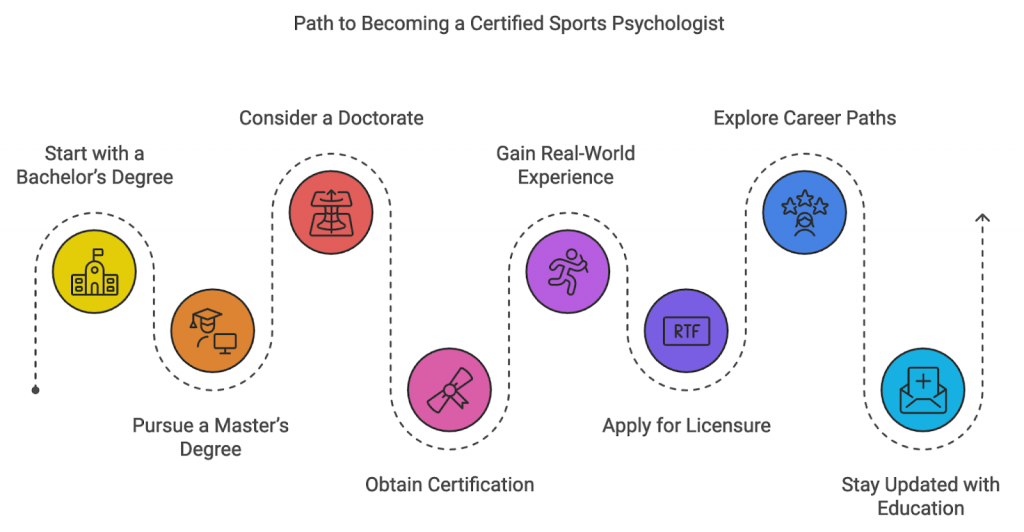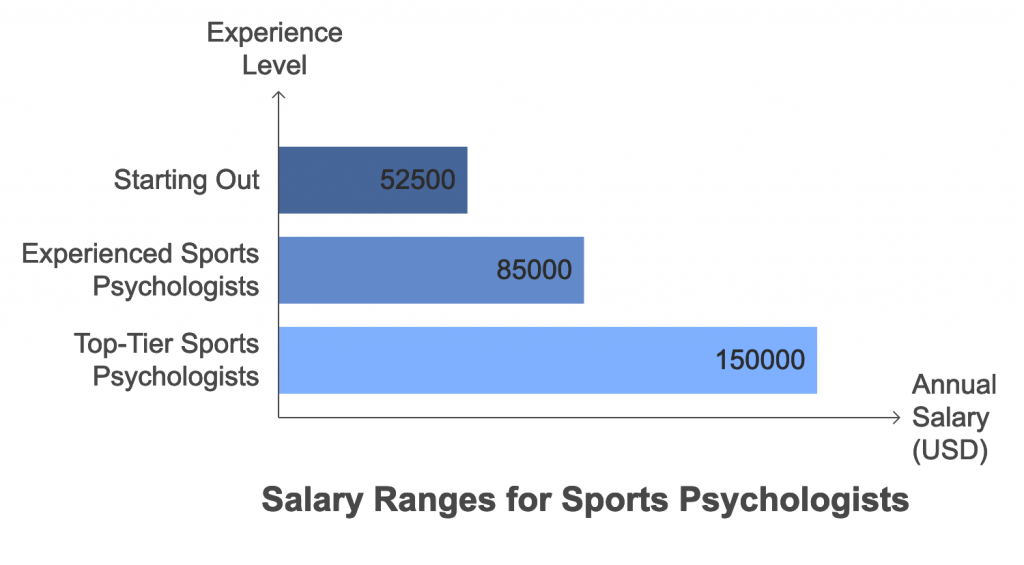How to Become a Certified Sports Psychologist
If you love sports and want to help athletes reach peak performance mentally, a career as a sports psychologist might be your calling. This field combines psychology and sports science to help athletes stay sharp, overcome pressure, and push their limits physically and mentally. Want to know how to get there? Here’s a step-by-step guide to becoming a certified sports psychologist.
Step 1: Start with a Bachelor’s in Psychology or a Related Field
Your journey starts with a bachelor’s degree, usually in psychology, sports science, or kinesiology. This is where you build a strong foundation in understanding human behavior, how the body works, and what drives people – pretty essential stuff for working with athletes.
Courses to Check Out:
- Introduction to Psychology
- Exercise Science
- Cognitive Psychology
- Sociology of Sport
Want to boost your experience? Try volunteering with athletic teams, getting a research role in a psychology lab, or interning in a sports setting. These will give you a solid sense of what it’s like to work in the field.
Step 2: Go for a Master’s in Sports Psychology or Something Similar
While you might find some jobs with a bachelor’s, most sports psychology positions require a master’s degree in sports psychology, counseling, or exercise psychology. A master’s program takes what you learned in your undergrad years and gets specific – think motivation techniques, mental training, and sports-focused counseling.
What You’ll Cover
- Applied Sport Psychology
- Mental Skills Training
- Counseling Techniques
- Motivation and Performance
Most programs also include an internship where you work with real athletes. This hands-on experience is essential as you practice the theories you’ve learned and see what helps athletes handle stress, stay motivated, and improve their game.
Step 3: Consider a Doctorate in Sports Psychology (Optional, but Powerful)
You don’t need a doctorate, but if you aim to work with elite athletes or lead research projects, a Ph.D. or Psy.D. could be a game-changer. A doctorate program deepens into advanced sports psychology topics and hone your research skills.
Specializations You Can Explore
- Clinical Sports Psychology
- Behavioral Neuroscience
- Applied Sports and Exercise Psychology
If you go this route, you’ll likely complete a dissertation or research project focusing on motivation or performance anxiety. Many students also work with sports teams or training facilities during this time, which can be a huge career boost later.
Step 4: Get Certified with a Recognized Credential
Certification is vital for making it official! One of the most respected credentials is the Certified Mental Performance Consultant (CMPC) from the Association for Applied Sport Psychology (AASP). This certification shows you have the right education, experience, and knowledge to work with athletes.
CMPC Requirements
- Master’s or doctoral degree in sports psychology or a related field
- At least 400 hours of supervised experience with athletes
- Passing the CMPC exam, which covers everything from sports psychology theories to ethics and applied skills
Other Options. Some sports psychologists also get credentials through the American Psychological Association (APA) or state licensure if they want to work as clinical psychologists in sports settings.
Step 5: Get Real-World Experience with Internships and Supervision
This is where things get practical. Building up hands-on experience is a must in sports psychology. Look for internships or supervised training during your studies, ideally with college sports programs, pro teams, or private practices. Working directly with athletes gives you insight into their challenges and the techniques that help them succeed.
Some great places to look for internships include:
- College and university athletic departments
- Professional sports teams
- Sports academies
- Sports-focused private practices
Step 6: Apply for Licensure (If You’re Going Clinical)
You’ll need a license to practice offering clinical services in sports psychology (like therapy for athletes). Licensing requirements depend on your state but generally require a doctoral degree, passing a licensing exam, and completing supervised clinical hours. Look up your state’s specific requirements since they can vary.

Step 7: Stay on Top of Your Game with Continuing Education
The sports psychology field constantly evolves, so keeping up with new research and trends is essential. Many certifications and licenses require ongoing education credits, which you can earn by attending workshops, conferences, or online courses.
Pro Organizations to Check Out
Step 8: Explore Career Paths in Sports Psychology
With your certifications and experience, there’s a lot you can do with sports psychology. Here are some of the most common career paths:
- Working with Pro Teams. Sports psychologists help professional athletes develop mental resilience, cope with performance anxiety, and stay focused. They assist them in keeping cool under high pressure and staying motivated.
- University Athletic Programs. A flood of colleges employ sports psychologists to support student-athletes’ mental health, enhance team performance, and manage stress. College sports are intense, and sports psychologists play a giant role in keeping athletes’ minds as strong as their bodies.
- Private Practice. Some sports psychologists work independently, offering services to athletes at all levels, from youth sports to pro athletes. In private practice, you might help with goal-setting, mental recovery after injury, or techniques for staying mentally tough.
- Military and Government Settings. Sports psychology principles are now applied to military training programs to build mental resilience and focus. It’s a growing area beyond just sports and taps into the mental toughness needed for high-stakes situations.
- Research and Teaching. If you’re into academics, you could pursue research or teach sports psychology. Topics like performance under pressure or injury recovery are constantly being explored, and universities need experts to contribute to this growing field.
How Much Can You Earn?
Salaries in sports psychology can vary widely, depending on where you work and your experience level. Here’s a brief look:
Sports psychologists working with top teams or in private practice often command higher salaries, especially if they have special skills or experience with high-performance athletes.

Button Line
Becoming a certified sports psychologist isn’t just about studying – it’s a mix of learning, real-world practice, and connecting with athletes on a deeper level. From helping pro teams stay focused under pressure to guiding young athletes through injury recovery, sports psychology can be a rewarding career that truly impacts lives. If you’re passionate about the mental side of performance and want to make a difference in sports, this path might be the perfect fit for you!



